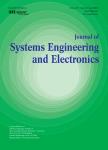Method of target tracking with Doppler blind zone constraint
Method of target tracking with Doppler blind zone constraint作者机构:Department of Air/Space based Early-warning EquipmentAir Force Early Warning Academy
出 版 物:《Journal of Systems Engineering and Electronics》 (系统工程与电子技术(英文版))
年 卷 期:2013年第24卷第6期
页 面:889-898页
核心收录:
学科分类:080904[工学-电磁场与微波技术] 0810[工学-信息与通信工程] 0809[工学-电子科学与技术(可授工学、理学学位)] 08[工学] 081105[工学-导航、制导与控制] 081001[工学-通信与信息系统] 081002[工学-信号与信息处理] 0825[工学-航空宇航科学与技术] 0811[工学-控制科学与工程]
基 金:supported by the Academy Innovation Fund Project (2013QNCX0101)
主 题:Doppler blind zone (DBZ) track breakage particle filter (PF) multi-hypothesis motion model (MHMM) measurementtrack association
摘 要:Doppler blind zone (DBZ) has a bad influence on the airborne early warning radar, although it has good detection performance for low altitude targets with pulse Doppler (PD) technology. In target tracking, the blind zone can cause target tracking breakage easily. In order to solve this problem, a parallel particle filter (PF) algorithm based on multi-hypothesis motion models (MHMMs) is proposed. The algorithm produces multiple possible target motion models according to the DBZ constraint. Particles are updated with the constraint in each motion model. Once the first measurement from the target which reappears from DBZ falls into the particle cloud formed by any model, the measurementtrack association succeeds and track breakage is avoided. The simulation results show that on the condition of different DBZ ranges, a high association ratio can be got for targets with different maneuverability levels, which accordingly improves the tracking quality.



